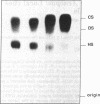Abstract
Myo-intimal proteoglycan metabolism is thought to be important in blood vessel homeostasis, blood clotting, atherogenesis, and atherosclerosis. Human platelet-derived transforming growth factor type beta (TGF-beta) specifically stimulated synthesis of at least two types of chondroitin sulfate proteoglycans in nonproliferating human adult arterial smooth muscle cells in culture. Stimulation of smooth muscle cell proteoglycan synthesis by smooth muscle cell growth promoters (epidermal growth factor, platelet-derived growth factor, and heparin-binding growth factors) was less than 20% of that elicited by TGF-beta. TGF-beta neither significantly stimulated proliferation of quiescent smooth muscle cells nor inhibited proliferating cells. The extent of TGF-beta stimulation of smooth muscle cell proteoglycan synthesis was similar in both nonproliferating and growth-stimulated cells. TGF-beta, which is a reversible inhibitor of endothelial cell proliferation, had no comparable effect on endothelial cell proteoglycan synthesis. These results are consistent with the hypothesis that TGF-beta is a cell-type-specific regulator of proteoglycan synthesis in human blood vessels and may contribute to the myo-intimal accumulation of proteoglycan in atherosclerotic lesions.
Full text
PDF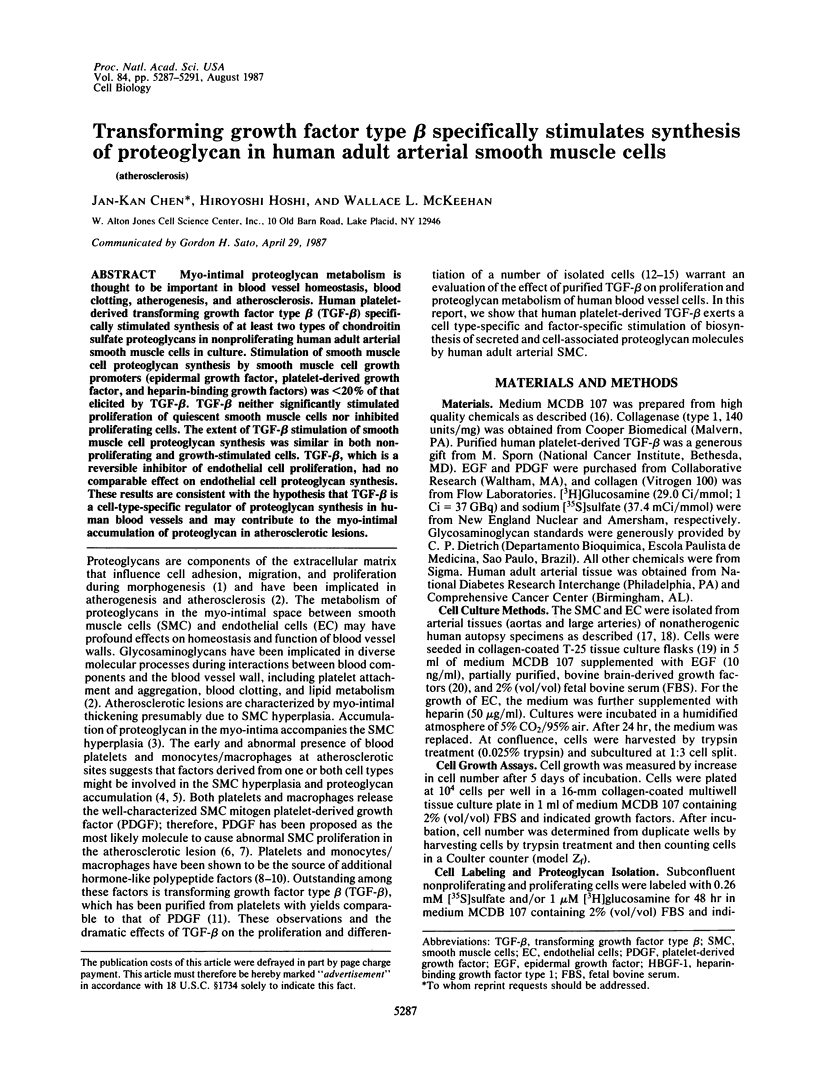
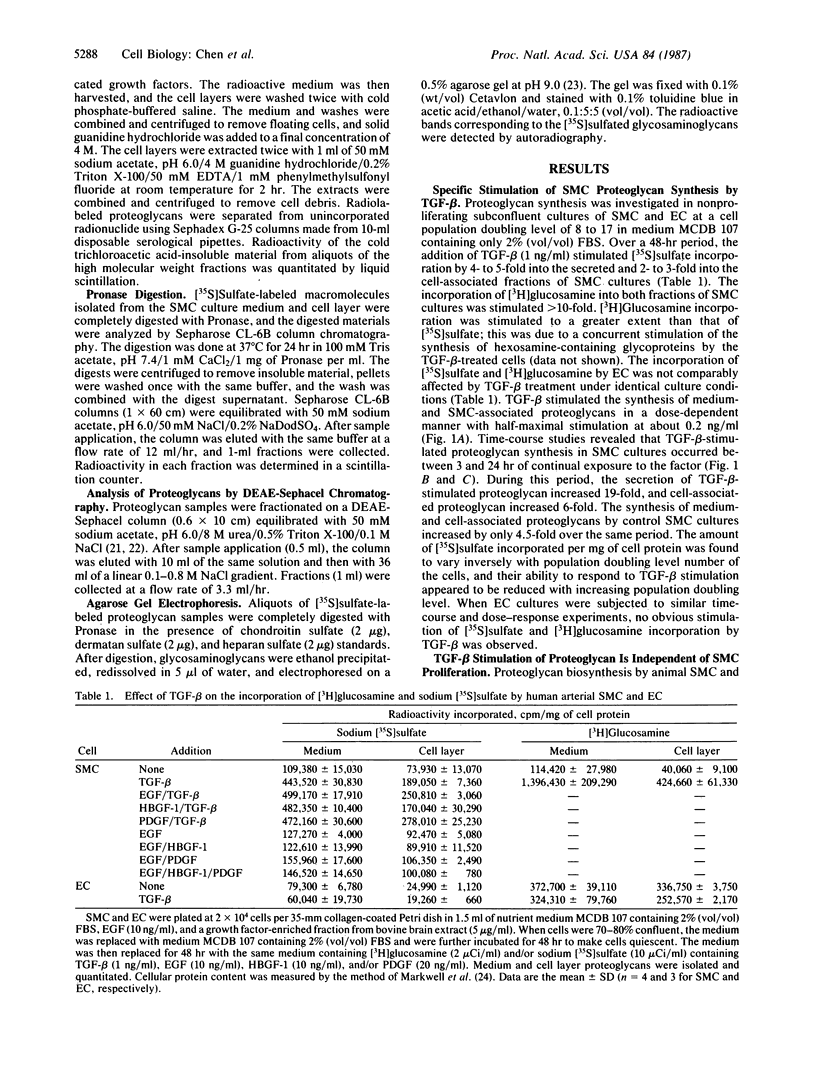
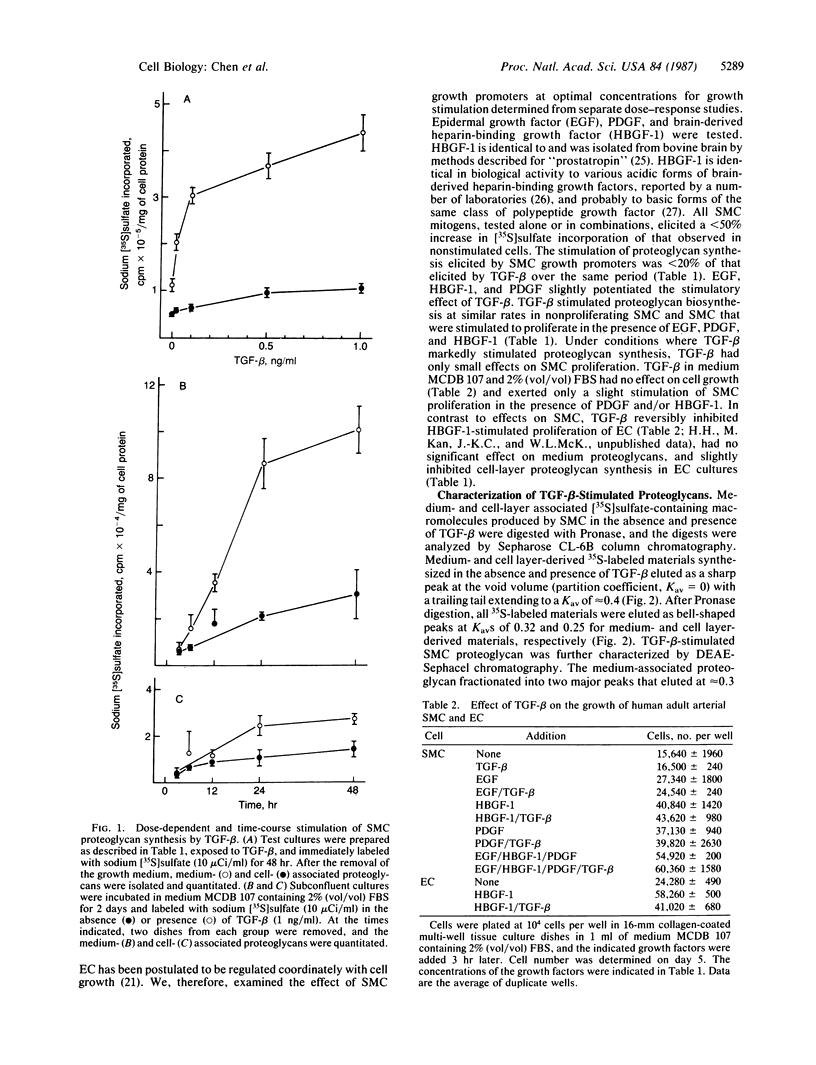
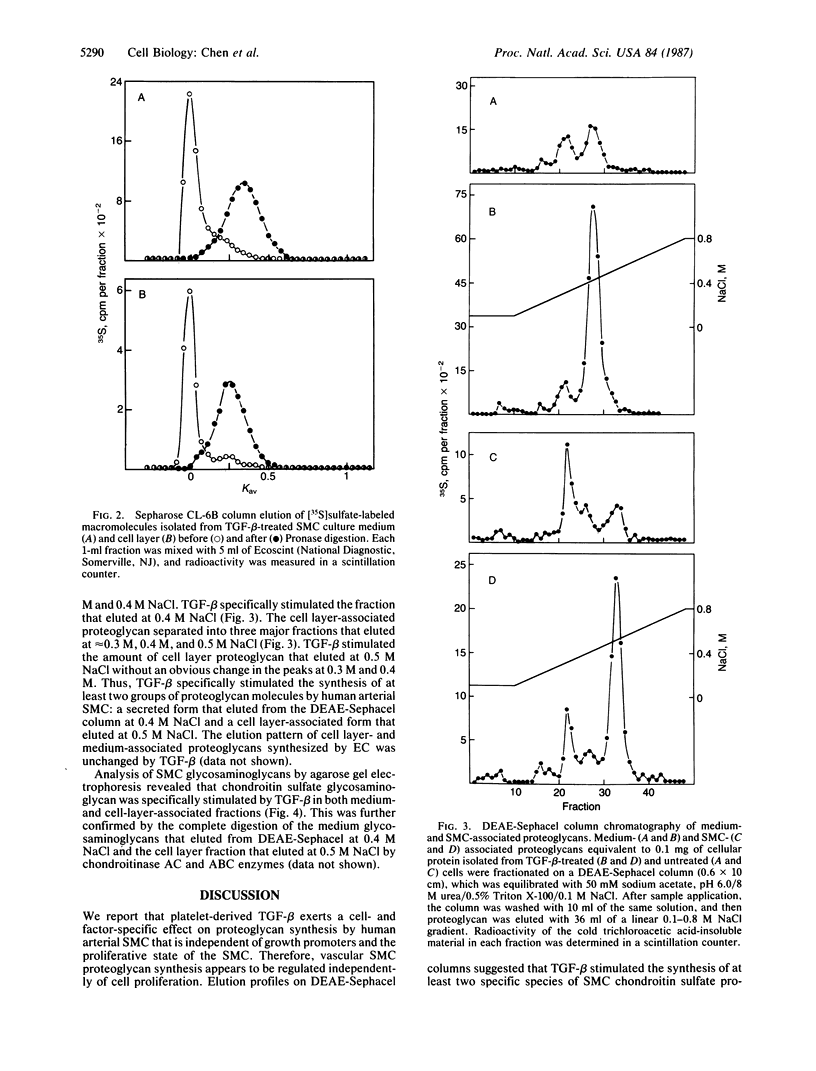
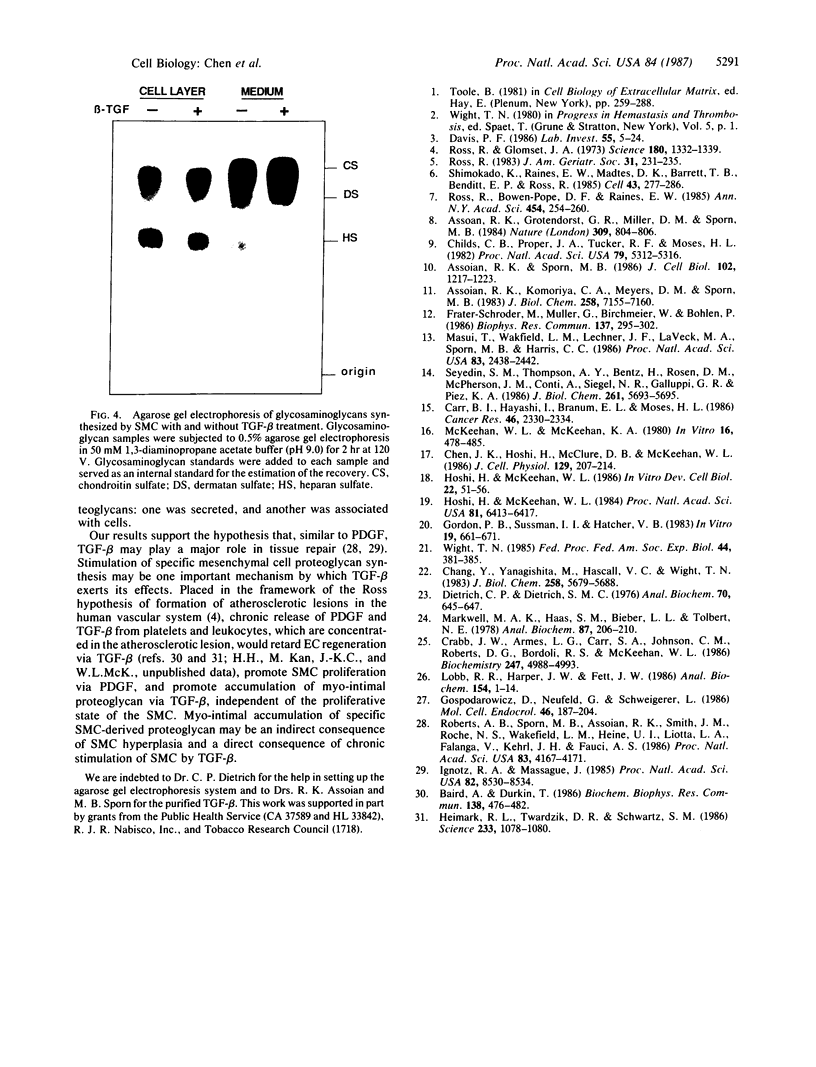
Images in this article
Selected References
These references are in PubMed. This may not be the complete list of references from this article.
- Assoian R. K., Grotendorst G. R., Miller D. M., Sporn M. B. Cellular transformation by coordinated action of three peptide growth factors from human platelets. 1984 Jun 28-Jul 4Nature. 309(5971):804–806. doi: 10.1038/309804a0. [DOI] [PubMed] [Google Scholar]
- Assoian R. K., Komoriya A., Meyers C. A., Miller D. M., Sporn M. B. Transforming growth factor-beta in human platelets. Identification of a major storage site, purification, and characterization. J Biol Chem. 1983 Jun 10;258(11):7155–7160. [PubMed] [Google Scholar]
- Assoian R. K., Sporn M. B. Type beta transforming growth factor in human platelets: release during platelet degranulation and action on vascular smooth muscle cells. J Cell Biol. 1986 Apr;102(4):1217–1223. doi: 10.1083/jcb.102.4.1217. [DOI] [PMC free article] [PubMed] [Google Scholar]
- Baird A., Durkin T. Inhibition of endothelial cell proliferation by type beta-transforming growth factor: interactions with acidic and basic fibroblast growth factors. Biochem Biophys Res Commun. 1986 Jul 16;138(1):476–482. doi: 10.1016/0006-291x(86)90305-0. [DOI] [PubMed] [Google Scholar]
- Carr B. I., Hayashi I., Branum E. L., Moses H. L. Inhibition of DNA synthesis in rat hepatocytes by platelet-derived type beta transforming growth factor. Cancer Res. 1986 May;46(5):2330–2334. [PubMed] [Google Scholar]
- Chang Y., Yanagishita M., Hascall V. C., Wight T. N. Proteoglycans synthesized by smooth muscle cells derived from monkey (Macaca nemestrina) aorta. J Biol Chem. 1983 May 10;258(9):5679–5688. [PubMed] [Google Scholar]
- Chen J. K., Hoshi H., McClure D. B., McKeehan W. L. Role of lipoproteins in growth of human adult arterial endothelial and smooth muscle cells in low lipoprotein-deficient serum. J Cell Physiol. 1986 Nov;129(2):207–214. doi: 10.1002/jcp.1041290212. [DOI] [PubMed] [Google Scholar]
- Childs C. B., Proper J. A., Tucker R. F., Moses H. L. Serum contains a platelet-derived transforming growth factor. Proc Natl Acad Sci U S A. 1982 Sep;79(17):5312–5316. doi: 10.1073/pnas.79.17.5312. [DOI] [PMC free article] [PubMed] [Google Scholar]
- Crabb J. W., Armes L. G., Carr S. A., Johnson C. M., Roberts G. D., Bordoli R. S., McKeehan W. L. Complete primary structure of prostatropin, a prostate epithelial cell growth factor. Biochemistry. 1986 Sep 9;25(18):4988–4993. doi: 10.1021/bi00366a003. [DOI] [PubMed] [Google Scholar]
- Davies P. F. Vascular cell interactions with special reference to the pathogenesis of atherosclerosis. Lab Invest. 1986 Jul;55(1):5–24. [PubMed] [Google Scholar]
- Dietrich C. P., Dietrich S. M. Electrophoretic behaviour of acidic mucopolysaccharides in diamine buffers. Anal Biochem. 1976 Feb;70(2):645–647. doi: 10.1016/0003-2697(76)90496-6. [DOI] [PubMed] [Google Scholar]
- Fràter-Schröder M., Müller G., Birchmeier W., Böhlen P. Transforming growth factor-beta inhibits endothelial cell proliferation. Biochem Biophys Res Commun. 1986 May 29;137(1):295–302. doi: 10.1016/0006-291x(86)91209-x. [DOI] [PubMed] [Google Scholar]
- Gordon P. B., Sussman I. I., Hatcher V. B. Long-term culture of human endothelial cells. In Vitro. 1983 Sep;19(9):661–671. doi: 10.1007/BF02628957. [DOI] [PubMed] [Google Scholar]
- Gospodarowicz D., Neufeld G., Schweigerer L. Fibroblast growth factor. Mol Cell Endocrinol. 1986 Aug;46(3):187–204. doi: 10.1016/0303-7207(86)90001-8. [DOI] [PubMed] [Google Scholar]
- Heimark R. L., Twardzik D. R., Schwartz S. M. Inhibition of endothelial regeneration by type-beta transforming growth factor from platelets. Science. 1986 Sep 5;233(4768):1078–1080. doi: 10.1126/science.3461562. [DOI] [PubMed] [Google Scholar]
- Hoshi H., McKeehan W. L. Brain- and liver cell-derived factors are required for growth of human endothelial cells in serum-free culture. Proc Natl Acad Sci U S A. 1984 Oct;81(20):6413–6417. doi: 10.1073/pnas.81.20.6413. [DOI] [PMC free article] [PubMed] [Google Scholar]
- Hoshi H., McKeehan W. L. Isolation, growth requirements, cloning, prostacyclin production and life-span of human adult endothelial cells in low serum culture medium. In Vitro Cell Dev Biol. 1986 Jan;22(1):51–56. doi: 10.1007/BF02623441. [DOI] [PubMed] [Google Scholar]
- Ignotz R. A., Massagué J. Type beta transforming growth factor controls the adipogenic differentiation of 3T3 fibroblasts. Proc Natl Acad Sci U S A. 1985 Dec;82(24):8530–8534. doi: 10.1073/pnas.82.24.8530. [DOI] [PMC free article] [PubMed] [Google Scholar]
- Lobb R. R., Harper J. W., Fett J. W. Purification of heparin-binding growth factors. Anal Biochem. 1986 Apr;154(1):1–14. doi: 10.1016/0003-2697(86)90487-2. [DOI] [PubMed] [Google Scholar]
- Markwell M. A., Haas S. M., Bieber L. L., Tolbert N. E. A modification of the Lowry procedure to simplify protein determination in membrane and lipoprotein samples. Anal Biochem. 1978 Jun 15;87(1):206–210. doi: 10.1016/0003-2697(78)90586-9. [DOI] [PubMed] [Google Scholar]
- Masui T., Wakefield L. M., Lechner J. F., LaVeck M. A., Sporn M. B., Harris C. C. Type beta transforming growth factor is the primary differentiation-inducing serum factor for normal human bronchial epithelial cells. Proc Natl Acad Sci U S A. 1986 Apr;83(8):2438–2442. doi: 10.1073/pnas.83.8.2438. [DOI] [PMC free article] [PubMed] [Google Scholar]
- McKeehan W. L., McKeehan K. A. Calcium, magnesium, and serum factors in multiplication of normal and transformed human lung fibroblasts. In Vitro. 1980 Jun;16(6):475–485. doi: 10.1007/BF02626460. [DOI] [PubMed] [Google Scholar]
- Roberts A. B., Sporn M. B., Assoian R. K., Smith J. M., Roche N. S., Wakefield L. M., Heine U. I., Liotta L. A., Falanga V., Kehrl J. H. Transforming growth factor type beta: rapid induction of fibrosis and angiogenesis in vivo and stimulation of collagen formation in vitro. Proc Natl Acad Sci U S A. 1986 Jun;83(12):4167–4171. doi: 10.1073/pnas.83.12.4167. [DOI] [PMC free article] [PubMed] [Google Scholar]
- Ross R., Bowen-Pope D. F., Raines E. W. Platelets, macrophages, endothelium, and growth factors. Their effects upon cells and their possible roles in atherogenesis. Ann N Y Acad Sci. 1985;454:254–260. doi: 10.1111/j.1749-6632.1985.tb11865.x. [DOI] [PubMed] [Google Scholar]
- Ross R., Glomset J. A. Atherosclerosis and the arterial smooth muscle cell: Proliferation of smooth muscle is a key event in the genesis of the lesions of atherosclerosis. Science. 1973 Jun 29;180(4093):1332–1339. doi: 10.1126/science.180.4093.1332. [DOI] [PubMed] [Google Scholar]
- Ross R. Recent progress in understanding atherosclerosis. J Am Geriatr Soc. 1983 Apr;31(4):231–235. doi: 10.1111/j.1532-5415.1983.tb05102.x. [DOI] [PubMed] [Google Scholar]
- Seyedin S. M., Thompson A. Y., Bentz H., Rosen D. M., McPherson J. M., Conti A., Siegel N. R., Galluppi G. R., Piez K. A. Cartilage-inducing factor-A. Apparent identity to transforming growth factor-beta. J Biol Chem. 1986 May 5;261(13):5693–5695. [PubMed] [Google Scholar]
- Shimokado K., Raines E. W., Madtes D. K., Barrett T. B., Benditt E. P., Ross R. A significant part of macrophage-derived growth factor consists of at least two forms of PDGF. Cell. 1985 Nov;43(1):277–286. doi: 10.1016/0092-8674(85)90033-9. [DOI] [PubMed] [Google Scholar]
- Wight T. N. Proteoglycans in pathological conditions: atherosclerosis. Fed Proc. 1985 Feb;44(2):381–385. [PubMed] [Google Scholar]




